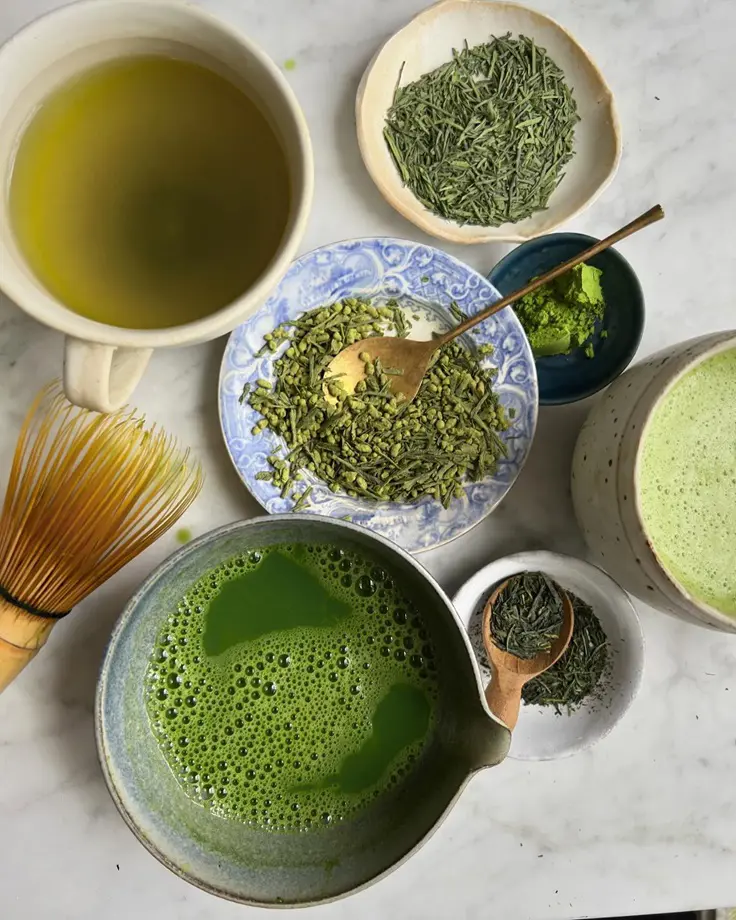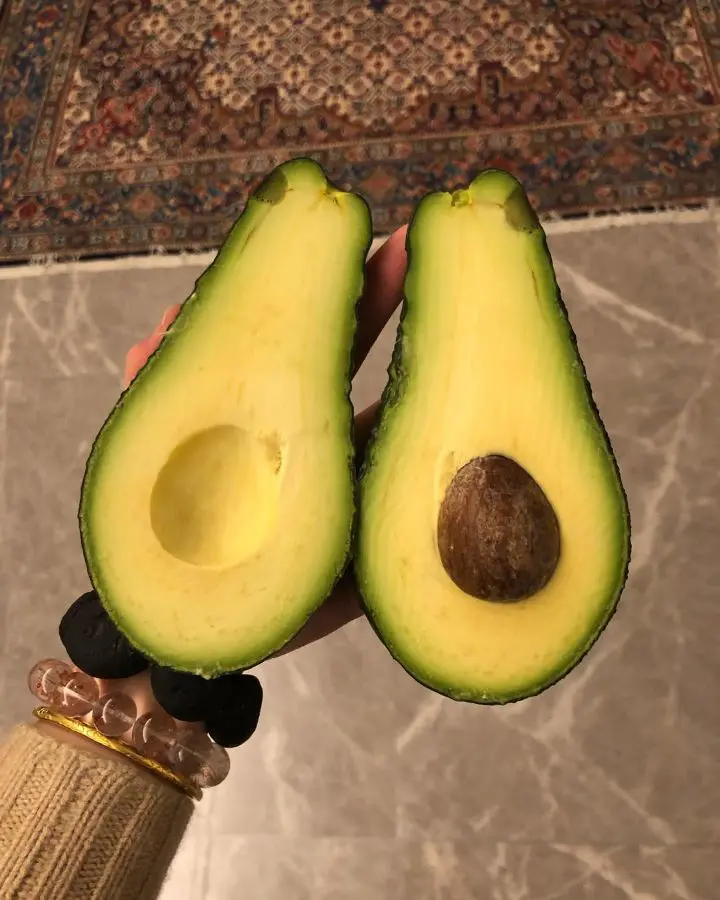Is Monk Fruit Healthy? Benefits, Nutrition And Risks
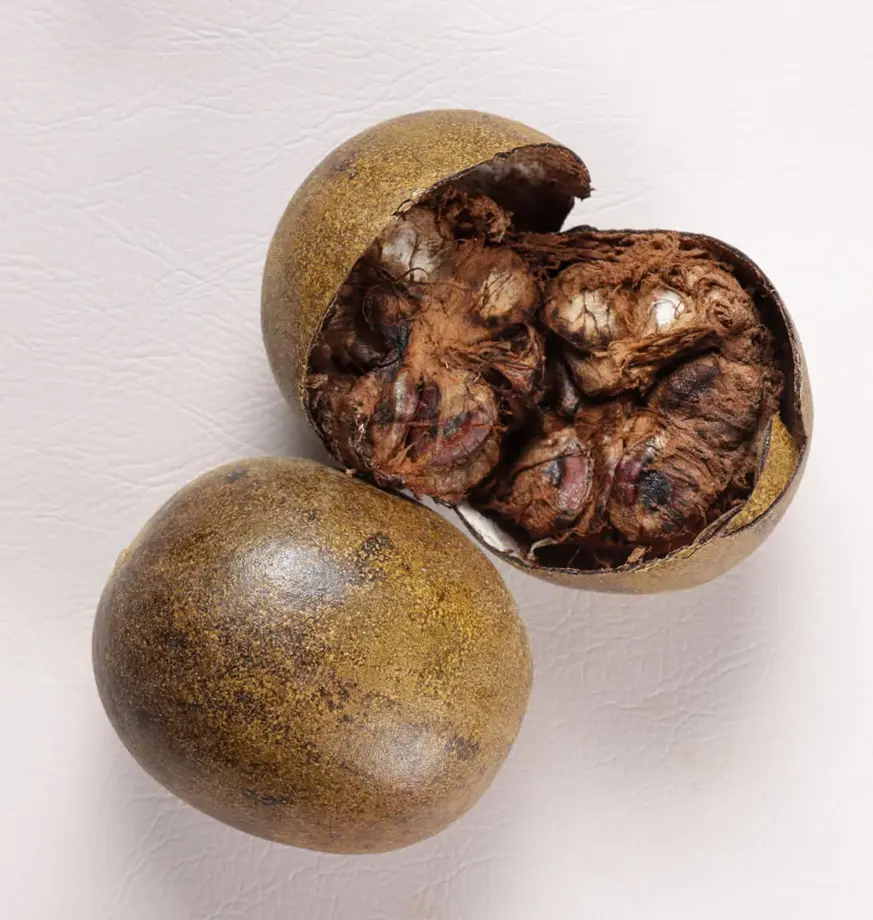
This post may contain affiliate links. If you make a purchase through links on our site, we may earn a commission.
Monk fruit is a simple vine of the gourd family that has recently gained fame as a sweetener. The fruit is hard to find in the market and has been less cultivated around the world, it's native to Southeast Asia.
A zero-calorie sweetener, there is a lot to know about monk fruit beyond its sweet taste. From health benefits, and nutrients to potential risks, many facts about it have been discovered till now. Let's look at the various aspects of it here, the ones that have allowed it to become the highlight of the food market in recent years.
What Is Monk Fruit?
Monk fruit came from the Southern part of China where it is known by the name of Luo Han Guo. This small fruit is round in shape and has a very sweet flesh which is processed to create a natural sweetener that is zero-calorie and much sweeter than sugar.
Monk fruit does have glucose and fructose, which makes the fruit sweeter, but ignoring this content, monk fruit sweetener is prepared with morgosides, a separate component present in the fruit.
Before being introduced to the U.S. market as a natural alternative to sugar, which just happened in recent decades at around 2010, monk fruit was popular in Chinese medicine. With the increasing demand for low-calorie sweeteners and healthier sugar substitutes, monk fruit is now popular and a favored choice as a healthier alternative to sugar.
How Sweet Is Monk Fruit Sweetener?
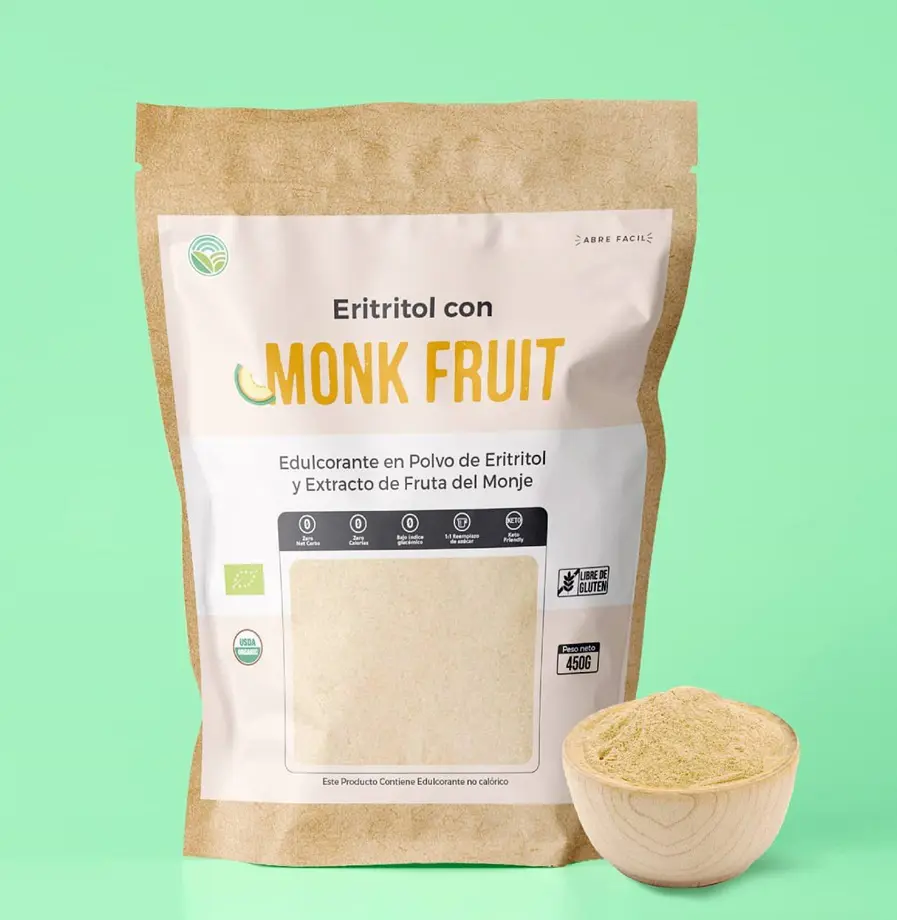
The sweetness of monk fruit is higher than our regular sugar, around 150 to 250 times more. Though the original fruit is sweet due to glucose and fructose, sweeteners have these compounds filtered out in them, instead, the sweetness is due to a unique compound called mogrosides. Mongrosides however don't add on calories or carbohydrates.
As the concentration of sweetness is very high, a small amount of monk sugar is enough for your sugar cravings. It can also be used in any dish that demands sweetness, without worrying about a different aftertaste, like that of stevia (bitter one).
Monk Fruit Serving Size
Monk fruit sweetener, coming from a plant source, is generally regarded as safe and does not have an officially recommended serving size from regulatory bodies. Since it contains no calories and has no significant adverse effects reported, it is considered safe for most people.
However, because of its extreme sweetness-being 150-250 times sweeter than sugar-only small amounts are typically needed to achieve the desired taste. As with any sweetener, it is recommended to use monk fruit in moderation, especially for those with specific health conditions, although no specific limits have been established by authorities.
Benefits of Monk Fruit
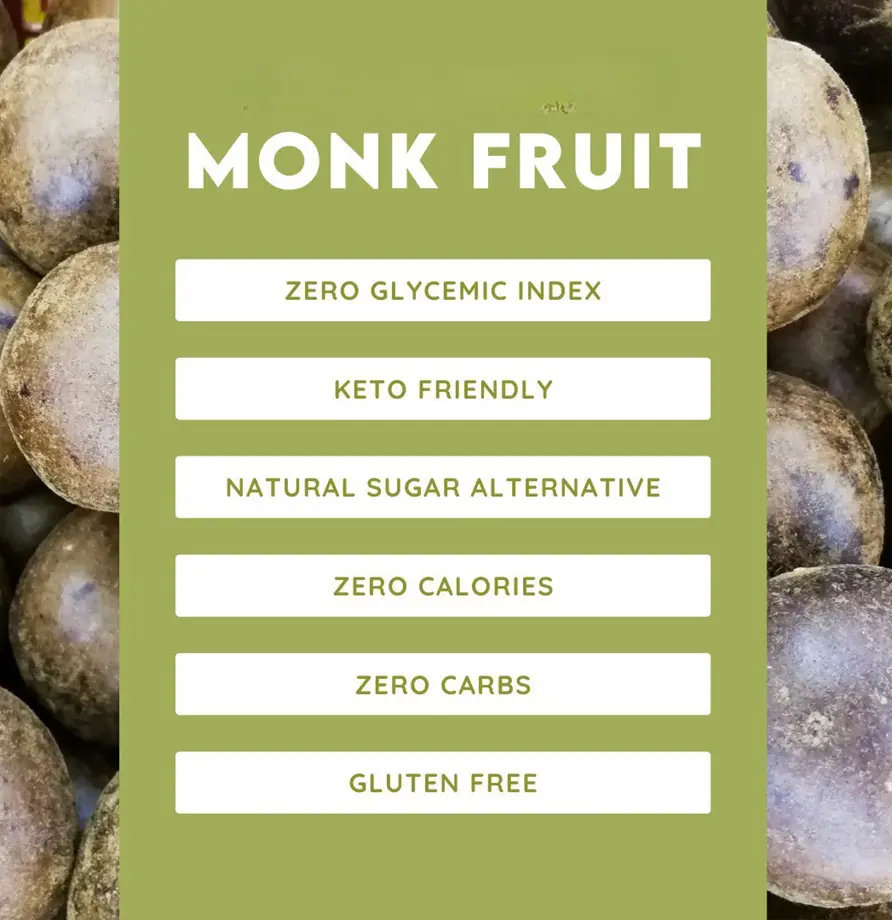
Monk fruit is not only an alternative for sugar, it has many benefits for our health. Some important ones include:
-
Helps Balance Blood Sugar Levels
People who need an alternative to sugar usually look up to natural sugars. The most compelling reason to choose monk fruit as a sweetener option is its ability to help balance blood sugar levels.
The regular sugar we consume can easily create spikes in the sugar level of blood, however, monk fruit as a sweeter neither contributes to the calories nor the sugar level. This property makes monk fruit a suitable alternative for people whose blood sugar level needs to be strictly regulated, such as in the case of diabetics. Overall, this safe, low-glycemic sweetener is for those monitoring their blood sugar.
2. Calorie-Free
In addition to being a better option for people who want to control their blood sugar level, this zero-calorie sweetener is also an attractive option for those trying to lose or maintain weight.
A teaspoon of regular sugar has around 16 calories, which can act as an enemy for weight loss, in contrast, monk fruit offers a sweet taste without the added caloric load. This characteristic is what makes it ideal for the ones on a calorie-restricted diet but still want to enjoy sweetness.
Natural sweeteners like monk fruit can hence be your weight-loss companion, they won't affect the results you are looking for and on the other hand, would let you enjoy sweet-tasting foods.
3. Anti-inflammatory Properties
Our body normally responds to injury or infection, the reactions that happen in the body combined together are called inflammation. These reactions when occur consistently for a long term are the reason for a variety of health conditions, the ones that are commonly heard of including heart disease, diabetes, and arthritis.
Though monk fruit is calorie-less, it still has natural antioxidants that help minimize the rate of occurrence of unwanted inflammatory reactions. As a result, any chronic diseases associated with prolonged inflammation subsides.
4. Anticancer Properties
There are researches that have been conducted on animals and test tubes, which have shown that monk fruit can be helpful in stopping the growth of cancer cells. The mogrosides compound present in the fruits is the compound known to be effective in stopping cancer cells.
The mechanisms of how the cancer cells are completely killed by monk fruit, however, have not been studied in detail. With further advanced studies, these promising early findings can be sought to develop anti-cancer therapies.
5. In Fighting Infections
Monk fruit is an essential part of Chinese medicine when it comes to treat lung conditions including infections. Mogroside, the compound in the fruit, is known to regulate immune reactions, which can easily protect us from infections.
The mongroside prevents the growth of or even kills the harmful infection-causing bacteria from multiplying as well. This property makes mongroside an efficient probiotic mostly useful in treating cough and any condition related to lungs.
6. In Chinese Medicine
Monk fruit is a natural ingredient in traditional Chinese medicine and is used only when prescribed. This whole fruit is advantageous in maintaining various conditions such as:
- Luo Han Guo can lubricate and cool the lungs, benefitting respiratory health by soothing and cooling the lungs.
- As it is cool in nature, the fruit is used to manage conditions when the body is overly heated.
- It is considered a remedy for inflammation of nodules and glands as well, the cooling effect is what works here as well, it helps to reduce swelling and lumps.
- Surprisingly, it also has a lubricating property, so whenever people have constipation, consuming monk fruit is known to provide relief.
These benefits can only be related to whole fruit. The sweeteners obtained from the fruit is devoid of most of the important compounds that are related to these benefits.
Nutrition of Monk Fruit
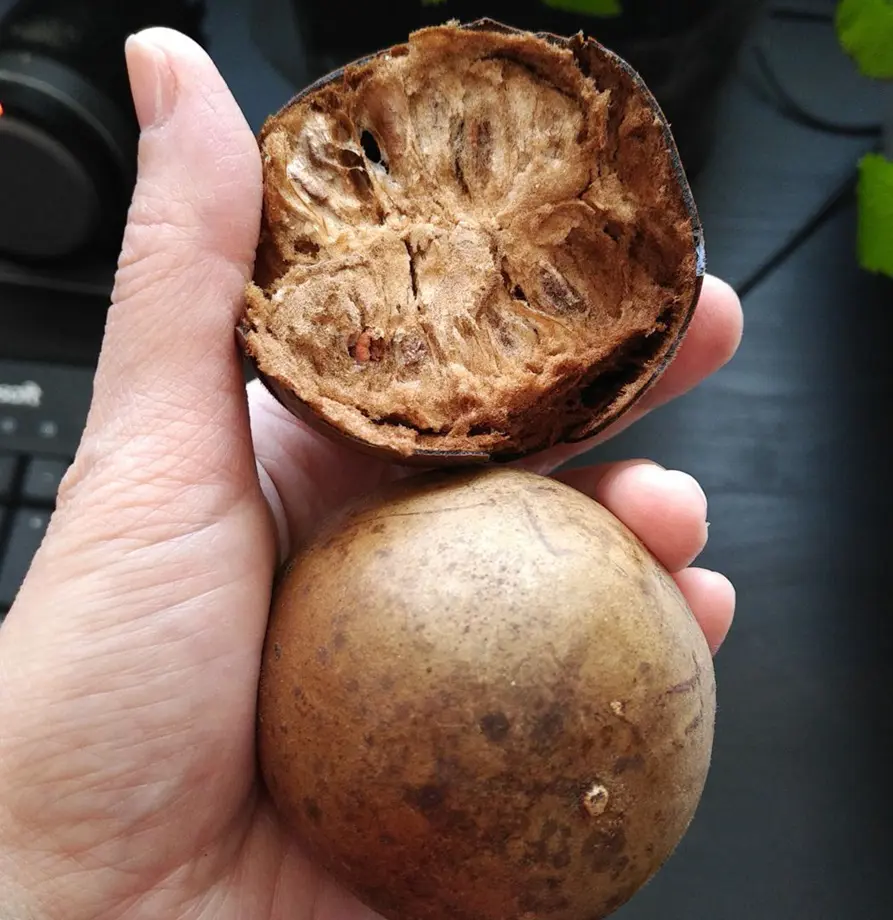
According to the USDA, a 100-gram of monk fruit powder used as a sugar substitute contains the following nutrients:
- Calories: 0 Kcal
- Carbohydrates: 100 g
- Protein, Fat and other nutrients: 0 g
When converted, a teaspoon (0.5g) of monk fruit powder has only around 0.5 grams of carbohydrates.
The sweetness of monk fruit sweetener is due to mogroside, which is not absorbed in our digestive system. This is the reason for the sweetener being calorie-less. Besides sweetness, monk fruit has no any vitamins, minerals and other major (or minor) nutrients to offer.
Risks of Monk Fruit
The majority of people consuming monk fruit haven't developed any allergic reactions after consuming monk fruit, however, it can vary depending on individuals. Some people might get allergies if they can't tolerate the compounds present in them. So, the only risk that comes with this sweetener is the possibility of experiencing allergic reactions including:
-skin irritation
-digestive issues.
The monk fruit has been recognized as safe (GRAS) by the U.S. Food and Drug Administration (FDA). The designation itself is provided only to foods that are considered safe for consumption in the right amount.
Talking about what amount is too much, being highly concentrated, it's ideal to use a small amount of monk fruit in the diet. Though there is no limit provided by the authorities and no studies have been done to understand the long-term effects, no adverse effects related to the consumption of monk fruit have been reported till now.
Monk Fruit Vs Other Natural Sweeteners

If your area has no monk fruit available, there are still other different natural sweeteners that can be used as a sugar alternative. The different natural sweeteners however have different characteristics when compared to monk fruit, depending on which you can choose an alternative for healthy eating.
Monk Fruit Vs Stevia
Monk fruit and stevia are both zero-calorie sweeteners derived from different plants. They both have unique characteristics including plants they are derived from to their compounds that help them deliver the sweetness. Monk fruit sweetener is made using a small green melon whereas stevia comes from the leaves of a plant called Stevia rebaudiana. The South Asian fruit, monk fruit, is hardly available in the international market, and compared to this, stevia is quite available in the markets.
Both the sweeteners are sweeter than sugar and the sweetness, however, is due to different compounds called mogrosides (in monk fruit) and steviol glycosides (in stevia) respectively. Monk fruit is on the more expensive side than stevia, despite the price tag, they are equally healthy alternatives for sugar.
Other Natural Sweeteners
Other than monk fruit and stevia, different natural sweeteners do exist. Some popular ones that are constantly used to replace sugar include honey and maple syrup.
Honey and maple syrup have their own distinct flavor, floral- and caramel-like, and are high in calories. While both can replace monk fruit in recipes, you might need to be thoughtful while adding them to delicate dishes as their stronger flavors might not give the desired outcome.
Artificial Sweeteners
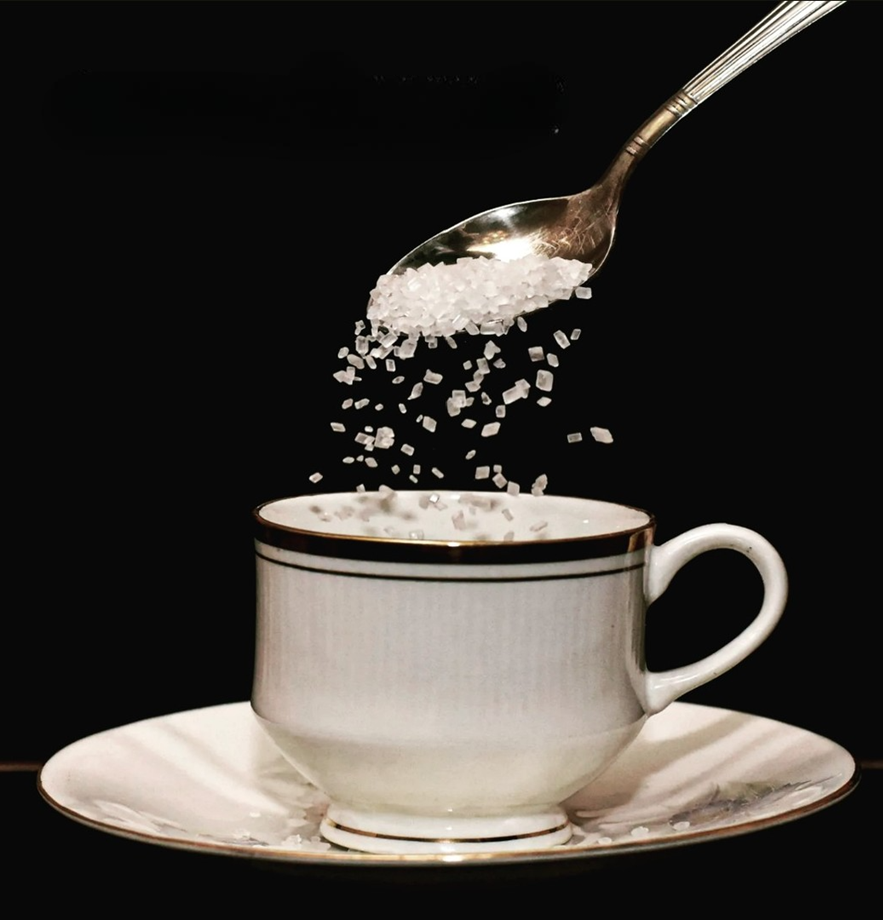
Artificial sweeteners are manufactured in industries using different compounds. Though they are used in food products to provide the sweetness of sugar without the calories, there are growing concerns about their long-term health effects. Some popular artificial sweeteners commonly used in our food industry are aspartame and sucralose.
Natural sweeteners are on the healthier side in the context that they come from natural sources and are minimally processed and studies have also found no adverse effects related to their intake. Different regulatory agencies like the FDA and WHO have set a limit for how much artificial sweeteners are safe to consume whereas there are no such limitations for natural sweeteners.
Monk Fruit Recipes

Monk fruit can be used in any dishes and drinks that uses sugar for sweetness. From your favorite coffee to bakery items, you can use this natural sweetener to prepare dishes as listed below:
- Tea and Coffee, or any other beverages: It can replace sugar in tea or coffee as well as your favorite drinks like smoothies, homemade lemonade, infused water and also alcoholic beverages like cocktails.
- Baking: Monk fruit can be used to maintain sweetness of cakes, cookies and any other bakery items. The use of this substitute will result in sweet baked goods, without overpowering the taste.
- Dairy products: The sweetener can also be used to add sweetness to dairy products like yogurt, home made ice cream and spreads made of cream cheese.
- To sweeten a variety of snacks and sauces like granola bars, protein bars, trail mix or sweet glazes for meats.
As monk fruit is available in both granular and liquid forms, its use in various recipes vary. For the desired consistency, always try to adjust the wet-to-dry ingredient ratio n your preparation. The recipes where monk fruit however don't get limited here. It can be used in many other recipes.
Replacement For Other Sugar Substitutes
Instead of other sugar substiture that are high in sugar and calories, you can use monk fruit to get that sweet taste without added calories. Let's have a look:
- Use it to replace syrups or agave nectar in smoothie bowls.
- To replace artificial sweeteners in drinks like tea, coffee, and smoothies.
- To replace high-fructose corn syrup in yogurt, ice cream, and custards.
- To replace honey in BBQ sauce, ketchup, or salad dressings.
Bottom Line
Monk fruit is a popular zero-calorie sweetener of recent times, it is 150 to 250 times sweeter than sugar. Although this natural sweetener lacks essential nutrients like vitamins and minerals, the presence of beneficial compounds like mogroside makes it extremely healthy.
As the sweetener is free of chemicals and artificial ingredients, it has no side effects like the ones an artificial sweetener has and till now, no risks associated with its consumption have been reported. The only thing that's important to check is for any potential allergens or additives in processed forms. Overall, monk fruit is a healthy, natural alternative to sugar without significant risks.
Recent posts
Lifestyle
Lifestyle
Is Agave Good For You? Benefits, Uses And Risks
When you stroll through the sweetener section at a supermarket or any other store, you probably notice bottles of golden agave nectar or agave's inulin with labels boasting claims like "natural" and "healthy". But is this viscous sweetener which come...
Lifestyle
How Much Caffeine Is in Green Tea
Green tea, a tea popular for its health benefits, comes with a gentle caffeine boost. Due to this low caffeine level, the drink can be considered perfect for those who want to stay alert without the jitters. The availability of caffeine in green tea ...
Lifestyle
The Benefits Of Avocado Seeds You Must Know About
After devouring the avocado, we have the habit of dumping the seed without giving it a second thought. However, this part of the fruit is just as essential as the avocado because it delivers numerous nutrients and potential health benefits that might...
Lifestyle
How Much Caffeine Is Too Much In One Day?
Without even realizing it, caffeine is stapling in our everyday lives. Our mornings usually begin with a cup of coffee, likewise, to get through the afternoon slump we might sip on an energizing drink or grab a refreshing soda on a sunny day to quell...
Lifestyle
How Much Water Should You Drink Per Day
Water makes up 60% of our total body weight, making it an essential component to maintain our health. As it is present in all cells and organs of the body, proper water intake means every function in the body is running well. There are multiple benef...
Lifestyle
What Happens When You Stop Eating Sugar
Sugar is one of the most widely consumed substances worldwide and, not to forget, in excess. The average intake of sugar in the USA exceeds the recommended amounts and that's what has contributed to the health havoc in the majority of the population....

